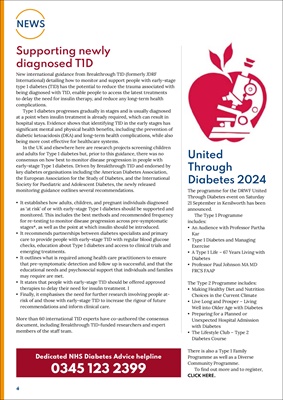
4
NEWS
Dedicated NHS Diabetes Advice helpline
0345 123 2399
Supporting newly
diagnosed T1D
New international guidance from Breakthrough T1D (formerly JDRF
International) detailing how to monitor and support people with early-stage
type 1 diabetes (T1D) has the potential to reduce the trauma associated with
being diagnosed with T1D, enable people to access the latest treatments
to delay the need for insulin therapy, and reduce any long-term health
complications.
Type 1 diabetes progresses gradually in stages and is usually diagnosed
at a point when insulin treatment is already required, which can result in
hospital stays. Evidence shows that identifying T1D in the early stages has
significant mental and physical health benefits, including the prevention of
diabetic ketoacidosis (DKA) and long-term health complications, while also
being more cost effective for healthcare systems.
In the UK and elsewhere here are research projects screening children
and adults for Type 1 diabetes but, prior to this guidance, there was no
consensus on how best to monitor disease progression in people with
early-stage Type 1 diabetes. Driven by Breakthrough T1D and endorsed by
key diabetes organisations including the American Diabetes Association,
the European Association for the Study of Diabetes, and the International
Society for Paediatric and Adolescent Diabetes, the newly released
monitoring guidance outlines several recommendations.
• It establishes how adults, children, and pregnant individuals diagnosed
as 'at risk' of or with early-stage Type 1 diabetes should be supported and
monitored. This includes the best methods and recommended frequency
for re-testing to monitor disease progression across pre-symptomatic
stages*, as well as the point at which insulin should be introduced.
• It recommends partnerships between diabetes specialists and primary
care to provide people with early-stage T1D with regular blood glucose
checks, education about Type 1 diabetes and access to clinical trials and
emerging treatments.
• It outlines what is required among health care practitioners to ensure
that pre-symptomatic detection and follow up is successful, and that the
educational needs and psychosocial support that individuals and families
may require are met.
• It states that people with early-stage T1D should be offered approved
therapies to delay their need for insulin treatment. I
• Finally, it emphasises the need for further research involving people atrisk of
and those with early-stage T1D to increase the rigour of future
recommendations and inform clinical care.
More than 60 international T1D experts have co-authored the consensus
document, including Breakthrough T1D-funded researchers and expert
members of the staff team.
United
Through
Diabetes 2024
The programme for the DRWF United
Through Diabetes event on Saturday
21 September in Kenilworth has been
announced.
The Type 1 Programme
includes:
• An Audience with Professor Partha
Kar
• Type 1 Diabetes and Managing
Exercise
• A Type 1 Life - 67 Years Living with
Diabetes
• Professor Paul Johnson MA MD
FRCS FAAP
The Type 2 Programme includes:
• Making Healthy Diet and Nutrition
Choices in the Current Climate
• Live Long and Prosper - Living
Well into Older Age with Diabetes
• Preparing for a Planned or
Unexpected Hospital Admission
with Diabetes
• The Lifestyle Club - Type 2
Diabetes Course
There is also a Type 1 Family
Programme as well as a Diverse
Community Programme.
To find out more and to register,
CLICK HERE.